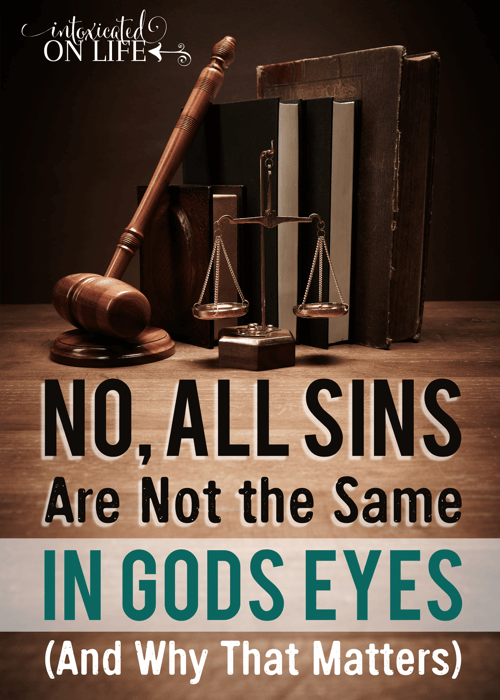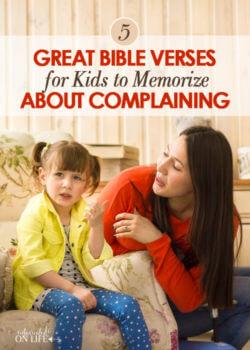The other day, I made a passing comment to a friend about Christian clichés I dislike—some because they are overused, some because they are gross over-generalizations, some because they’re simply untrue. Here were a few I mentioned…
- “God helps those who help themselves”
- “God loves the sinner but hates the sin”
- “Forgive and forget”
- “I don’t feel led”
- “You are enough” (yeah, my wife wrote a post on that pet peeve)
Among those I really dislike is this little gem: “All sins are the same in God’s eyes.“
On one level, it makes sense why some would believe all sins are equal. Since all sins are hell-worthy, this might give the impression God sees all sins the same. After all: hell is hell. Can’t get much worse than hell.
Furthermore, if we say all sins are not equal, doesn’t this promote a kind of self-righteous Phariseeism? I mean, if it’s possible for your sins to be worse than mine, won’t I be tempted to feel justifiably better than you?
But all of this is based on a superficial logic and a misunderstanding of the Bible.
Jesus Teaches All Sins Are Not Equal
1. Jesus says some sins are greater.
Standing before Pontius Pilate, the governor reminds Jesus he has the power to sentence Him to death. Jesus replies to him, “You would have no authority over me at all unless it had been given you from above. Therefore he who delivered me over to you has the greater sin” (John 19:11, emphasis added).
Caiaphas and the Sanhedrin were guilty of a greater sin than Pilate, even though Pilate would be the one to officially condemn Jesus to die. Even though he would act cowardly and selfishly in his ruling, Pilate was acting out of his God-given authority as a civil magistrate (Romans 13:1). But the Jewish leaders had maliciously and deceitfully delivering Jesus to Pilate, despite being part of God’s chosen nation. Their sin was greater.
2. Jesus says some are more willing to repent than others.
After the cities of Chorazin, Bethsaida, and Campernaum had largely rejected Christ’s message, Jesus denounced these cities, saying, “it will be more bearable on the day of judgment for Tyre and Sidon than for you,” and “it will be more tolerable on the day of judgment for the land of Sodom than for you” (Matthew 11:20-24, emphasis added). Bear in mind, all of these lands will face Judgment Day, but for some, that judgment will be “more bearable.”
The lands of Tyre, Sidon, and Sodom were notoriously wicked cities that had already undergone destruction in the past due to their sin, but Jesus says these wicked cities “would have repented long ago in sackcloth and ashes” had they seen the works of Christ (v.21, 23). This is why their judgement will be more bearable—their hearts were not as hard. Their punishment will be less severe as a result.
3. Jesus says some will be punished more severely that others.
Jesus tells a parable in which a wise manager goes away on a journey, leaving a servant in charge of his household. The chief servant abuses his power by beating the other servants and getting drunk. The master then returns home at a day and hour the servant didn’t expect. Catching the servant red-handed, the master casts him out with the unfaithful (Luke 12:46).
Jesus then makes clear God’s justice will be based, in part, on what we know of our Master’s will: “And that servant who knew his master’s will but did not get ready or act according to his will, will receive a severe beating. But the one who did not know, and did what deserved a beating, will receive a light beating. Everyone to whom much was given, of him much will be required, and from him to whom they entrusted much, they will demand the more” (v.47-48, emphasis added).
Why are those in-the-know given a more severe beating? Because their disobedience is a willful disregard of their master’s command. Their sin is worse than those who don’t fully know the will of God.
4. Jesus says some matters of the Law are weightier than others.
In his final public address, Jesus issued many strong words to the Jewish leaders. At one point He says, “Woe to you, scribes and Pharisees, hypocrites! For you tithe mint and dill and cumin, and have neglected the weightier matters of the law: justice and mercy and faithfulness. These you ought to have done, without neglecting the others” (Matthew 23:23, emphasis added).
Clearly, in Jesus’ mind, there are matters of obedience that are, in a sense, closer to the heart of the Law than others. Tithing from your herb garden is good, but it isn’t nearly as central as justice, mercy, and faithfulness. To neglect these weightier matters of the Law is a more grave offense.
Why Does This Matter?
1. This truth helps us to remember God is the perfect Judge.
Of course, we still need to remember and need to teach our kids that all sin is evil. No one gets a pass just because his or her sin isn’t as bad as his neighbor’s sin. “For whoever keeps the whole law but fails in one point has become accountable for all of it” (James 2:10).
But this truth helps us to teach our kids that God is just. He doesn’t paint evil with a broad brush. God is not a trite judge who categorizes stealing your sisters toy with the crimes of Hitler.
The fact that not all sins are equal is the foundation for other motivating Biblical doctrines:
- There will be different degrees of reward on Judgement Day (Matthew 25:14-30; Luke 19:11-27) – As believers, though we are all citizens of the heavenly Jerusalem, we will still be rewarded according to our works (Revelation 20:12). This ought to inspire us please God (2 Corinthians 5:9-10), help us to take the mantle of Christian leadership seriously (James 3:1), and make sure our work for the Lord is of the highest quality (1 Corinthians 3:10-15).
- There will be different degrees of punishment in hell (Matthew 11:21-24) – Hell is a hard doctrine for any child (or adult) to swallow, but it is a comfort to know that God’s punishment will be just. Though everyone in hell will be “away from the presence of the Lord and from the glory of his might” (2 Thessalonians 1:9), no everyone’s misery will be the same.
2. This truth helps us to correct our kids justly.
“Let it always be seen that you are more displeased at sin than at folly.” – John Witherspoon
When it comes to how we correct our children, do our attitude, intensity, and words reflect God’s justice?
As someone who struggles quite a bit with anger, I am more and more acutely aware of how tempted I am to abuse my parental authority by weighing my kids’ mistakes and sins in my own scale of justice, not God’s scale.
Often I discipline my kids not because of how their behavior offends God, but for things threaten my comfort, my plans, my sense of control of a situation, or my productivity.
But if we, as parents, fill our minds with an understanding of God’s justice, we will have an internal filter for how we correct our kids. Our intensity and focus will match what God says about their sin. Our discipline will fit the crime.
- Principle #1: More entrusted knowledge means more culpability (Leviticus 4:13-14; Luke 12:48 Romans 3:20). A child’s age, intellectual maturity, and previous instruction matter in how we react to his or her sin. When you’ve had a chance to give formative instruction, and when you’ve entrusted your child with a duty based on that instruction, a failure to comply is a more grave offense. Act and speak accordingly.
- Principle #2: Intentional rebellion is worse that irresponsibility (Numbers 15:27-31; Psalm 19:13 Hebrews 10:26). To neglect ones duties because of tiredness or distraction must be corrected, but to neglect a duty out of “high handed” rebellion (“No, I won’t do what you say”) is a more grave offense. Act and speak accordingly.
- Principle #3: A soft heart is more important than outward compliance (Matthew 15:8; Mark 7:21; 2 Peter 2:20). Often the way we direct our kids is aimed at them just getting stuff done. As important as this is, the focus of our correction needs to be on the heart: a desire to obey, a repentant heart, a love for God and others. If our children don’t outwardly comply but show signs of heart-softening repentance, our attitude should reflect pleasure in this. If our children comply with out wishes but do so begrudgingly, our attitude should reflect being troubled by this.
All three of these principles focus on the heart. Before we barrel ahead with our corrective words, we need to pause and really ask what the child’s state of mind is, allowing our demeanor to follow accordingly.
Giving Grace in the Face of Sin
Of course, a more grave offense—one that is based on more knowledge, is intentionally rebellious, or is hardhearted—does not necessarily means our demeanor should be hotheaded, rash, or shaming. Rather, we should see it as an opportunity to share the gospel with our kids. Even when our child’s sin is great, we must remember that God’s grace is greater (Romans 5:20).
No, Not All Sins Are Equal…
Believing God does not see all sins the same can be liberating. It frees us up to react to our own sin, the sins of our kids, and the sins we see in the world appropriately.
It makes me pause and really think about my reactions—do my passions, my volume, my intensity, and my choice of words reflect that I know the difference between sins of ignorance and foolishness and sins of hardheartedness and rebellion?











Jesus said all of this before he was crucified. Before he was crucified sins did differ in depth now their weight (zero) is the same IF you believe Jesus died for your sins.
Yes, he said all these things before he was crucified, and yes all sins are atoned for by the death of Christ, but that does not mean each sin is now “zero.” The only reason why Jesus’ death means anything at all is if our sins are truly burdensome and weighty, otherwise, what did Jesus bear on the cross. Jesus said there will still be a gradation of sins counted on judgment day (Matthew 11:20-24; Luke 12:47-48)—well after he died for sins.
So He’s not the same or perfect God before the cross??? That is wrong thinking.
I’m confused. You quoted James 2:10 that states that if you fail one law, you’ve failed (are accountable for) them all. Is that not the same as saying all sins are equal? Why if they are unequal, are we accountable for all if we only commit one? Why would the 10 commandments contain together sins such as lying and murder in virtually the same breath?
I can’t say that if my child lies to me and then takes the Lord’s name in vain, that I would not be more upset about one versus the other. However, that doesn’t mean God cannot see it that way. People used t be stoned for adultery. The same practice is not done today because it became more widely accepted (sad) and people considered it an archaic law. Does that mean that we should say that God is not as upset about that as He is about murder? Besides, who are we to judge what God feels is a greater sin than the next? How do we know that because the world says lying is not as bad than adultery, that God feels the same way? Treating our sins as if they are on different levels can open the door for us to begin to more readily accept the things the world has begun to accept. This doesn’t mean that we have to give a murderer a free pass or give a liar the death penalty. I’m suggesting that if we start viewing lying, stealing or any other other “lower” sins as not as “Big” as the others, I think we are sending a message to our children that says that we think we know better than God. What do you think?
No. I’m not sure why you would say that about James 2:10. Perhaps you could explain more. What James 2:10 says is, “For whoever keeps the whole law but fails in one point has become accountable for all of it.” This says nothing about all sins being equal. It says if you fail to keep the law in any point, “you have become a transgressor of the law” (v.11). The point is to show people that highlighting the sinfulness of one sin while completely ignoring another (specifically another you are committing), is turning a blind eye to a major problem. Sinning in any manner makes you a transgressor.
You asked, “I’m suggesting that if we start viewing lying, stealing or any other other ‘lower’ sins as not as ‘Big’ as the others, I think we are sending a message to our children that says that we think we know better than God.” While I’m not sure about those specific examples, I do not think this communicates we know better than God. If I tell my son the Pharisees’ sin was greater than Pontius Pilate’s sin, this doesn’t communicate I know better than God. It communicates the very thing Jesus communicated to Pilate himself. When God himself says not all sins are equal and we tell our kids this (and show them the examples), then we’re just being good Bible teachers.
Ok Thanks for your input. 🙂
This article is great. I was surprised by the title as I was raised to believe all sins are equal, but you are right. The funny thing is that in church last week our sermon was on this very topic, and how there will be different amounts of responsibilities given in Heaven based on our works on earth, which is something I had never ever thought about before. It’s funny how the timing of your article lines up with our sermon just last weekend since it is something I had never considered, yet God has found a way to reiterate what he is teaching me through your article. Then again, it’s not so funny after all. 🙂
Fun. I’ve often found how God likes to reinforce lessons this way.
It’s true any sin will keep you out of heaven. In that way they are the same. All sins can be forgiven. They are the same that way too. It’s in the consequences you see the difference.
Teachers will be judged more harshly if they lead His children astray. Sexual sin is against your own body. Children, the weak and the strangers are valued by God and you better not hurt them or abuse them! They are close to the hearty of God. The parable of the sheep and goats shows us how He judges how we treat the least of these.
I totally agree on the heart first, before obedience! Because God looks at the heart! That is so important if you want to see you children continue to walk with The Lord after they leave your nest! That partially explains why young adults walk away.
Good article!
Thanks for the comment.
Thanks Mama2eight!
This was an eye-opening post- seemed as though I was listening to a sermon. Thanks so much for sharing with your readers. Great job!
Thanks, Sabrina!
Now the problem that needs to be addressed is the definition of sin. We’ve got that wrong too, and when you look at your article with the correct definition of sin, it makes complete sense. Sin isn’t a bad thing we do or breaking the Law. It’s a defiance against, and a breaking of relationship with God. It is our willful hearts claiming to be enough, it’s a distrust of His character, it’s us rejecting his Lordship. You know how God is complete in the Trinity? There’s Three, and One. Because the Three act and move as One. We are meant to be a reflection of Him, and the only way we can reflect Him is if we are complete in Him as well. We have decided that the reflection is enough. And so we aren’t reflecting any longer but have made ourselves out to be gods. A reflection or image of Someone isn’t alive without the Someone. The Law was written because we broke the image, we broke the communion, and the Law was to tell us how we would be living if we were in the right relationship with Him. Death comes to the sinner and is the ultimate consequence of sin because we aren’t reflecting the Image of God! Jesus came, became one of us, took on the consequence of our brokenness, and showed us the proper way to live in reflection of God. And even gave us a way to do just that. Such amazing, GOOD news. But the problem is when we think that sin is just us breaking the law, we think there’s a possibility of us fixing it, and there’s also the problem of us judging others based on the Law. So when we think on your article with this definition of sin, we can see that Pilate’s sin was less because he wasn’t trying to break the relationship as badly. But the relationship is what is so important. Jesus didn’t come to take us back to Sinai, He came to take us back to the Garden. When we walked in the cool of the evening with the God whose Image we loved, adored, and followed. I wish I could emphasize that with big bold letters! It’s important, it’s vital, it’s essential that we understand HE WANTS RELATIONSHIP! With us! It is only in right relationship that we have a chance of following the Law, but that is a consequence of being in right relationship, not the goal.
I agree a correct understanding of sin is essential. When we see sin as something relational, then the “gradation” of sins makes a lot of sense, doesn’t it?
“It is only in right relationship that we have a chance of following the Law, but that is a consequence of being in right relationship, not the goal.” Wow. Just wow. That is so profound. Thank you for this! 😀
This was really thought provoking- thank you. It revealed to me what differing views I held about sin etc. I think I’ve clarified it more in my mind now, and thank you so much for all the scriptures- it is good to have God’s word as my plumbline in all this! 🙂
You’re welcome, Hannah!
Hey Luke, I don’t know why this rubs me wrong. I know all sins are not the same, but really it’s only God who can judge the sin. Sexual sin as Paul points out is against our own bodies so that differentiates it a bit. However, ask most people why God destroyed Sodom and Gomorrah and they will tell you because of homosexuality. However, that’s not what Ezekiel 16:49 tells us. Those sins (rampant in our society today and dare I say the church as well) may have led to rampant sexual sin. God seems to focus a bit more on sins of the heart. The harshest words Jesus used were not for the sinners caught in sexual sin or stealing from others. He reserved the most sober of words for the religious hypocrites of the day. If we try to determine what sins are worse than others, aren’t we in danger of becoming some of those same hypocrites.
Here are the facts:
1. We are ALL sinners
2. All of our sin is bad and any one of those sins damns us to hell
3. We all need help because we can’t stop from sinning
4. God gave us a Savior to rescue us from sin
5. When I focus on Jesus as Lord, my sin management seems to take care of itself
6. Jesus summarized all law in 2 commands: Love God, love others
7. Seems to me the worst sins are to NOT love God and to NOT love others
Ok, that last one is my conclusion, not fact :>)
I don’t know that I disagree with you, which makes me question why this post rubs you the wrong way. What specifically don’t you agree with?
I love this. To me it doesn’t give us free reign to try and determine such sin falls where on God’s scale, but to realize that some are worse, only God knows, and I should kept my heart pliable and obedient.
And not let wives being beaten be told not turning a cheek is the same as physical violence. That phrase is used most by people who want to justify their own sin.
Thanks, Rachel!